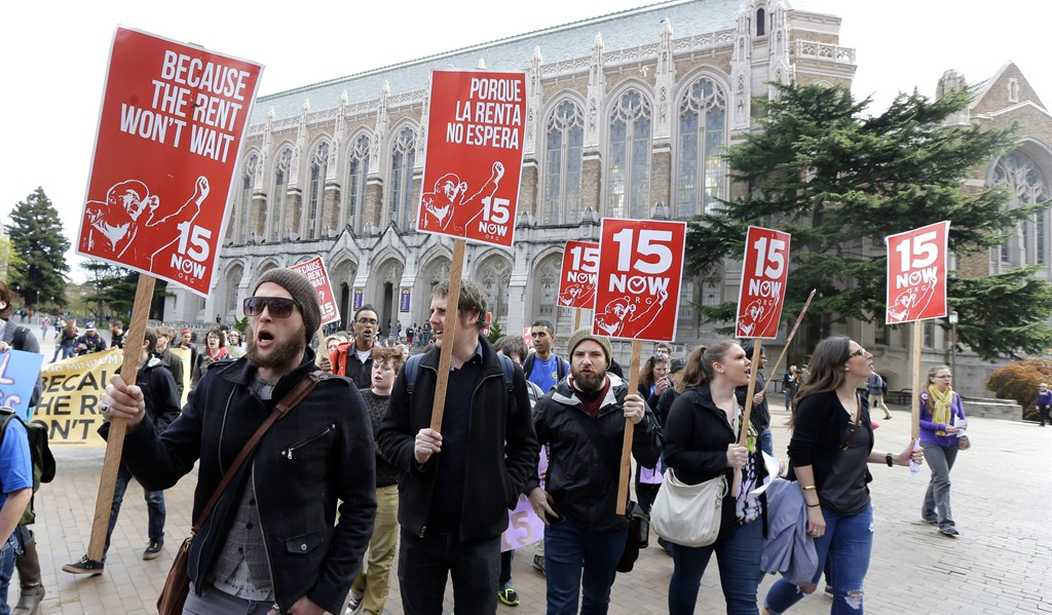It should shock no one: denying unskilled workers the opportunity to sell their labor for less ends up disadvantaging those unskilled workers against better-skilled ones.
That’s precisely what standard economic theory predicts. It’s what common sense should tell you.
And it’s what a major new study — with access to more data sets than ever before — says does happen. Minimum wage laws put workers at the lowest rung of the economic ladder out of work.
But, but . . . I hear the sputtering: minimum wage laws are nearly everywhere, and sure are popular.
Well, not every popular idea about policy is good. Or bad.
So how do we tell the difference?
One way is evidence.
The modern administrative state was promoted heavily by social scientists who thought that piecemeal social engineering should be tested. A few even thought that the older experiment in limited-government federal republicanism gave Americans a near-ideal testing ground: “the laboratoriesof democracy.”
Which is why the new study is so interesting. Activists and politicians have been pushing big increases in the minimum wage in cities around the country. Seattle, Washington, has been one of those, establishing an $11.00/hour legal minimum in April of 2015, then raising that minimum by two dollars in 2016. The City of Seattle commissioned a study of “the wage, employment, and hours effects of the first and second phase-in of the Seattle Minimum Wage Ordinance,” and it shows clear results.
While the first hike had somewhat ambiguous results, the second hike led to a 9 percent reduction in hours worked at wages below $19/hour. That is a major finding.
And there’s more.
After the increase to $13, there was a reduction of over $100 million per year in total payroll for low-wage jobs. But, as they say in advertising, there’s even more!
Recommended
The total payroll losses average out to about $125 per job per month. That is a reduction in income for over a hundred bucks per month.
When you are poor, a hundred dollars seems like real money.
I bet most Americans would miss $125 per month.
No wonder one economist called the minimum wage hike an “unmitigated disaster.” Workers lost a lot.
But they were not the only losers. Those who depend upon the cachet that minimum wage hikes provide lost, and lost big. Catching a whiff of the new study’s general tenor, Seattle pols hired another team of economists to cook up a study to counter the official one, a new study to support the popular regulation.
This isn’t so much science but paying for plausible deniability.
Denying economic reality is getting harder and harder, though. Take the recent study from Denmark. This study looked at a “discontinuity” in the minimum wage laws in the Nordic state: the stringent wage floor kicked in for workers at age 18. And the study found a drop-off in employment at that exact age, a drop-off that could not reasonably be attributed to other factors.
And speaking of other factors, consider the businesses dependent upon low-skilled workers. By increasing costs, minimum wage hikes can push some businesses out . . . of business. When we make it harder to turn a profit, it becomes harder to profit.
Businesses that can’t at least break even close their doors.
And businesses that do not exist cannot hire workers.
And this is where the policy debate turns funny. There do exist many business owners who are inclined to promote, politically, politicians who in turn support minimum wage hikes. Do they change their minds when mugged by reality?
One such mugging occurred in Minneapolis, among business owners who stress their “Sandernista” credentials.
“I’m a bleeding-heart liberal and I’m a big Bernie Sanders supporter,” says businesswoman Jane Elias, an art store owner. “But this whole flat-out, $15, one-size-fits all is just wrong.” Another victim, restaurant owner Heather Bray, says she’s a “proud, proud progressive.” But: “The arithmetic doesn’t work. People will not continue to go to budget-conscious restaurants when they’re no longer budget-conscious.”
So . . . arbitrary minimum-wage demands don’t add up in light of the demands of running their businesses under their particular circumstances. Well, no disagreement here. But take it further, please. Keep doing the math. The bottom line is that everybody, not just you — and always, not just sometimes — has the right to make his own decisions about his own life and property.
And profit by it.
Freedom for business owners and wage laborers works, so to speak. Better, certainly, than the self-proclaimed do-good interventions of politicians and experts.
























Join the conversation as a VIP Member